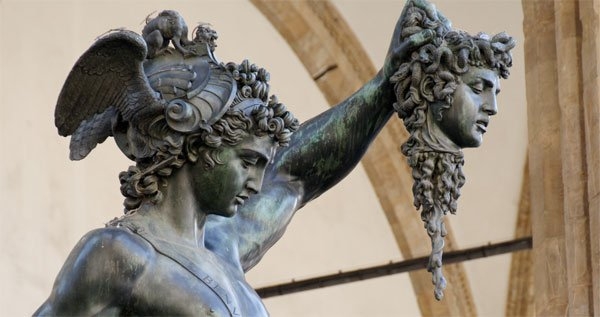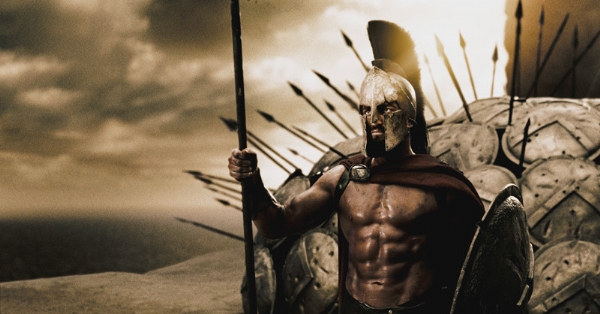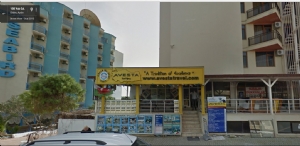According to the myth, there once was a king named Acrisius, who had a beautiful daughter named Danae. The Oracle of Apollo told Acrisius that there would come a day when Danae's son would kill him; so he locked Danae in a bronze tower so that she would never marry or have children.
According to the myth, there once was a king named Acrisius, who had a beautiful daughter named Danae. The Oracle of Apollo told Acrisius that there would come a day when Danae's son would kill him; so he locked Danae in a bronze tower so that she would never marry or have children.
The tower had no doors, except for one very small window. Danae was very sad, until one day, a bright golden light came through the small window; a man appeared holding a thunderbolt in his hand and although Danae knew he was a god, she didn't know which one. The man said, "Yes, I am a god and I wish to make you my wife. I can turn this dark prison into a wonderful, sunny and blooming land."
Indeed, the horrible prison turned into fields as beautiful as the Elysian Fields themselves, but one day Acrisius saw light coming out of the small window. He told his men to tear down one of the walls. When he entered, he saw Danae smiling and holding a baby on her lap. This was Perseus. Acrisius was furious, so he locked Danae and baby Perseus in a large chest and cast them out to sea.
Somehow, they managed to arrive safely to the island of Seriphos, where
Polydectes ruled. The king's brother, Dictys, who was a fisherman, caught the chest in his net and pulled it to shore, freeing Danae and her son. Perseus grew up to become a strong young man. Polydectes heard about Danae and asked her in marriage, but she rejected him. If it wasn't for Perseus, Polydectes would have married Danae by force; so the king decided to create a plan to get rid of the young man.
Polydectes pretended to marry the daughter of his friend. Everybody had to bring a wedding present, including Perseus. However, Perseus, being poor, had not brought anything, and Polydectes pretended to be furious. After a heated discussion, Perseus said he would bring him anything the king would ask; so Polydectes asked for the head of the Gorgon Medusa.
Perseus set forth on his adventure; he wandered for days, searching for the Gorgons lair. One night, in an unknown country he realized how hopeless things were. Medusa was a horrible creature, who had snakes growing out of her head instead of hair, and a terrifying gaze that literary petrified anyone who would look into her eyes. In his despair, a tall woman and a young man with winged sandals appeared and introduced themselves as goddess Athena and god Hermes. Hermes said that they were all siblings as Perseus was in fact the son of Zeus, so they would help him in his quest; so Hermes offered him his winged sandals and the sickle that was used by Cronus to castrate Uranus; while Athena gave him her shield, so that Perseus would not have to look straight into Medusa's eyes. They also gave him further information on how to find the lair of Medusa.
So Perseus went to the cave of the Graeae, who would lead him further in his adventure. The Graeae were three women who shared a single eye among them. So, when one of them was about to give the eye to one of the others, Perseus grabbed it and blackmailed them to aid him. So, the Graeae informed him that he should find the Nymphs of the North to get the Cap of
Darkness which would make him invisible, as well as a magic bag.
After getting these two items, Perseus eventually went to the lair of Medusa and her sisters, whom he found sleeping. He wore the Cap of Darkness, and unseen managed to kill Medusa using the sickle; he then used the shield to carry the head and place it into the magic bag, for even though it was dead, the head still have the potential to turn someone into stone. Medusa's sisters woke up and attacked Perseus, but he flew away using his winged sandals.
On his way back to Seriphus, he had many adventures; in one of them, he came across the Titan Atlas, who was condemned to carry the heavens on his shoulders. To release him of his pain, Perseus turned him into stone using Medusa's head, so that he would no longer feel the weight of his burden.
Later on, he saw what looked like a statue chained to a rock, so he went to investigate. He saw that it was not a statue, but a woman, and asked her why she was chained to the rock. "My name is Andromeda", she replied, "and I have been punished because of my vain mother. She boasted that I was more beautiful than the Nereids. Poseidon was angered and said that I must be sacrificed to a sea monster," she said. Even as she spoke a monster rose from the sea. Perseus pulled Medusa's head out of the bag; the sea monster turned to stone and crumbled to pieces. Perseus cut Andromeda's chains and took her to her father, King Cepheus of Phoenicia. When Perseus asked Andromeda's hand in marriage, Cepheus gladly agreed. So, Perseus and Andromeda set off for Seriphus.
On the way they stopped at Larisa, so Perseus could compete in some games that were held at that time; however, when he threw a discus, it hit an old man who instantly died. The man was Acrisius and therefore, the prophecy became true; after mourning, Perseus and Andromeda set off again.
When they arrived at Seriphus, the first person they met was Dictys, the fisherman who had brought Danae and Perseus ashore many years ago. Dictys told them how Polydectes had never really married, but since Danae wouldn't marry Polydectes, he forced her to be his handmaiden. Perseus was furious, so he asked Dictys to take care of Andromeda, in order to avenge for his mother's mistreatment.
Perseus stormed to the palace, walked in and said, "Let all who are my friends shield their eyes!" So saying he raised Medusa's head and Polydectes and his courtiers were immediately turned to stone. Perseus and Andromeda lived happily for many years and their descendants became great kings, the greatest of them all being
Heracles, the strongest man in the world.
Eventually, Perseus was killed by Dionysus. To be immortalised, Perseus and Andromeda were turned into stars and would live together in the sky.
Clash of the Titans (the movie)
Clash of the Titans is a 2010 fantasy film (remake of the 1981 film of the same name), loosely based on the Greek myth of Perseus. (CAREFUL, SPOILERS FOLLOW!!!)
The film begins with a narration describing how the Olympians managed to overthrow their own creators, the Titans, through the aid of the Kraken, Zeus's creation. After their fierce struggle, Zeus (Liam Neeson) became the King of the Gods, his brother, Poseidon (Danny Huston), the Lord of the Seas, and their brother, Hades (Ralph Fiennes), tricked by Zeus to rule the sickening Underworld in chaos and terror.
A coffin is then seen drifting through the sea before it is rescued by a fisherman, Spyros (Pete Postlethwaite). When Spyros opens it, he discovers the baby Perseus and his mother, Danae, inside and raises the boy as his own. Perseus does not know who his real father and mother are, and worries that he will be neglected when his adoptive parents have a child of their own, but Spyros reassures him of his love. Years later, Perseus (Sam Worthington) and his family are fishing when they witness a group of soldiers from Argos destroying a massive statue of Zeus, effectively declaring war on the gods. Immediately following the fall of the statue, Zeus rises from the ocean, killing most of the soldiers and then destroying the boat Perseus and his family are on. Perseus attempts to save his family from the sinking boat, but is unable to, and passes out on driftwood from the wreckage. The surviving soldiers find him and take him back to Argos.
When King Cepheus (Vincent Regan) and Queen Cassiopeia (Polly Walker) of Argos, at a feast for the returning soldiers,
compare themselves to the gods and compare the beauty of their daughter, Andromeda (Alexa Davalos), to that of Aphrodite, Zeus appears again, killing the remaining soldiers. When Perseus is unaffected by his attack, Zeus realizes he is a demigod, and tells him of his true father, himself. Zeus kills the queen, and demands that Argos further pay for its insolence and vanity; in 10 days, the Kraken will be released, and if the princess Andromeda is not sacrificed, then Argos will be destroyed. Zeus then seeks out the gods on Mount Olympus and convinces Zeus to agree to his plan in order to punish mankind for their lack of love.
Initially, the Argives see Perseus as an agent of the gods and imprison him, but the king later seeks his help. A woman named Io (Gemma Arterton), who has been watching over Perseus his entire life, advises him that the only way to avenge the death of his family is to agree to the king's wishes and attempt to defeat the Kraken. He is sent out with a small group of soldiers, led by Draco (Mads Mikkelsen), along with Io to seek the Stygian Witches, while Zeus visits
Acrisius (Jason Flemyng), a disfigured man who was married to Danae when Zeus impregnated her with Perseus.
When Acrisius planned to kill his wife and the newborn Perseus, Zeus sent down a thunderbolt from Olympus, badly scarring and disfiguring Acrisius' entire body. To help him achieve his goals, Zeus imbues him with superhuman powers to enable him to kill Perseus. Acrisius attacks the Argive group, killing several, and even when his hand is severed in the fight, his blood falling on the sand causes giant scorpions to rise from the desert and continue the attack. Perseus and the Argives manage to kill the first two scorpions, but are surrounded by three more, even larger than the first. As they are about to attack, the scorpions are suddenly calmed by a group of Djinn, gentle and benevolent Sand-Demons with magical powers.
There is initially mistrust between the two groups, until the chief heals Perseus of grave injuries sustained during the fight, and the two sides agree to cooperate.
Perseus and his group, via the scorpions, arrive at the barren, rocky "Garden of Stygia", the site where the Gods ended the Great War and defeated the Titans. They find the three Stygian Witches, who are hideous and share one eye. They tell Perseus, after he threatens to throw their eye off the mountain, that Medusa's head will be able to kill the Kraken, but that he will die in the process. The soldiers go to the Underworld, where Medusa lives in
seclusion in a temple, and only the soldiers enter (Io cannot because she is a woman). Medusa turns all the remaining soldiers into stone, the Djinn destroys himself with his heart, weakening Medusa, and Draco, who is gravely injured by one of Medusa's arrows early in the fight, rescues a cornered Perseus by skewering Medusa with a stone pillar from the ceiling and allows himself to be turned to stone in order to give Perseus a clear shot at Medusa's head. Perseus, eyes shut, kills Medusa. As he exits the temple, Acrisius returns and stabs Io. Perseus fights him again and, this time, successfully kills him, which turns Acrisius back to human form. Io dies, telling Perseus "this is the part of the journey you do alone..."
Perseus finds Pegasus and flies back to Argos as the Kraken is being released, thus destroying the city. As a priest is about to sacrifice Andromeda, Zeus appears, and has his creatures attack Perseus and steal Medusa's head
. Perseus defeats the creatures and regains the head, as well as successfully turning the Kraken to stone before it consumes Andromeda. Zeus appears once more and boasts that he cannot die because he is immortal; but Perseus throws his sword, charged together with Zeus's lightning at him which banishes him to the Underworld. Perseus then saves Andromeda from drowning when the apparatus used to restrain her falls into the ocean, but refuses to become king of Argos.
In the final scene, Perseus stands at the broken statue of Zeus seen at the beginning. Zeus appears and offers to make Perseus a god on Olympus; but he refuses. Zeus notes that Zeus will return one day for revenge when mankind is in fear. Zeus states that if Perseus is still intent to stay on earth then he might give him a gift since he is the son of Zeus after all. A resurrected Io appears before Perseus, and the two begin to embrace while Pegasus flies above them.





